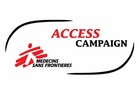Médecins Sans Frontières
By
Médecins Sans Frontières
Published: July 7, 2014, 8:54 p.m.·
Tags:
Advocacy,
Access,
Public health
MSF warns that higher medicine prices caused by harmful new rules in the TPP trade pact will disproportionally affect the poorest populations across all countries in the pact: Australia, Brunei, Canada, Chile, Japan, Malaysia, Mexico New Zealand, Peru, Singapore, United States, and Vietnam.
Read More →
By
Médecins Sans Frontières
Published: July 4, 2014, 8:59 p.m.·
Tags:
None
Cambodia wasn’t initially on Helen Tindall’s radar. But the extremely high prevalence of tuberculosis has made it a country she is reluctant to leave.
Read More →
By
Médecins Sans Frontières
Published: July 2, 2014, 11:14 a.m.·
Tags:
Advocacy,
Treatment,
Access,
Drug-resistant TB
Patients & MSF doctors elated as MCC approval for Médecins Sans Frontières to use generic linezolid paves the way for national registration and access.
Read More →
By
Médecins Sans Frontières
Published: July 2, 2014, 10:07 a.m.·
Tags:
HIV coinfection
With 26 percent of the adult population infected with HIV, Swaziland has the world’s highest HIV prevalence. The country is also faced with a tuberculosis (TB) epidemic. TB is the leading cause of death among people living with HIV, and is becoming more difficult to treat following the emergence of drug resistant forms of the disease. In Swaziland more than 80 percent of people infected with TB are living with HIV.
Read More →
By
Médecins Sans Frontières
Published: June 25, 2014, 8:26 p.m.·
Tags:
Treatment,
Drug-resistant TB
25 June 2014 - Khayelitsha, South Africa - Khayelitsha, a township in the Western Cape, South Africa, is home to approximately 500,000 residents and has some of the highest rates of HIV and tuberculosis globally. In response to the growing burden of drug-resistant tuberculosis (DR-TB) in Khayelitsha, Medecins Sans Frontieres (MSF), in collaboration with the City of Cape Town Health and the Provincial Government of the Western Cape, began piloting a decentralized model of care for DR-TB in 2007. The patient-centered, community-based model was thereafter implemented in 10 primary health care clinics (PHC) within the sub-district, and is now managed in its entirety by the local Department of Health. In 2011, various aspects of this decentralized model were adopted and implemented across other sub-districts in Cape Town as well as other provinces in South Africa.
Read More →
By
Médecins Sans Frontières
Published: June 13, 2014, 4:58 p.m.·
Tags:
Treatment,
Access,
Drug-resistant TB,
Advocacy
South Africa could realise savings of up to 42% through fully decentralised models of care, but fragmented, slow government response sees policy stutter after 3 years; MSF negotiates to expand access to effective drugs for more patients at lower price.
Read More →
By
Médecins Sans Frontières
Published: May 21, 2014, 3:48 p.m.·
Tags:
Global TB response,
Drug-resistant TB,
Advocacy
Phumeza Tisile, co-author of the DR-TB Manifesto and XDR-TB survivor, delivers urgent plea to World Health Assembly delegates on behalf of 50,000 supporters worldwide.
Read More →
By
Médecins Sans Frontières
Published: April 28, 2014, 6:44 p.m.·
Tags:
Treatment,
Access,
Drug-resistant TB
Siyabulela Qwaka is the latest patient cured of drug resistant TB in MSF’s project in Khayelitsha, South Africa. His story is an inspiration for the others currently fighting the new form of tuberculosis against which existing drugs are of limited effectiveness.
Read More →
By
Médecins Sans Frontières
Published: April 15, 2014, 10:47 a.m.·
Tags:
TB epidemiology
With the current health system in Cambodia at its limit, Médecins Sans Frontières has trialled an active case finding project that targets high-risk groups for tuberculosis.
Read More →
By
Médecins Sans Frontières
Published: March 22, 2014, 5:15 p.m.·
Tags:
Treatment,
Access,
Drug-resistant TB,
Advocacy
The ministry of health must act to stop drug resistance from spiralling.
Read More →
Page 4 of 8 · Total posts: 10
←First
3
4
5
Last→
